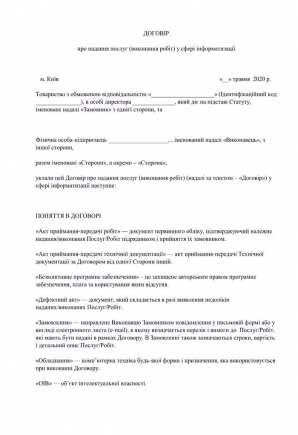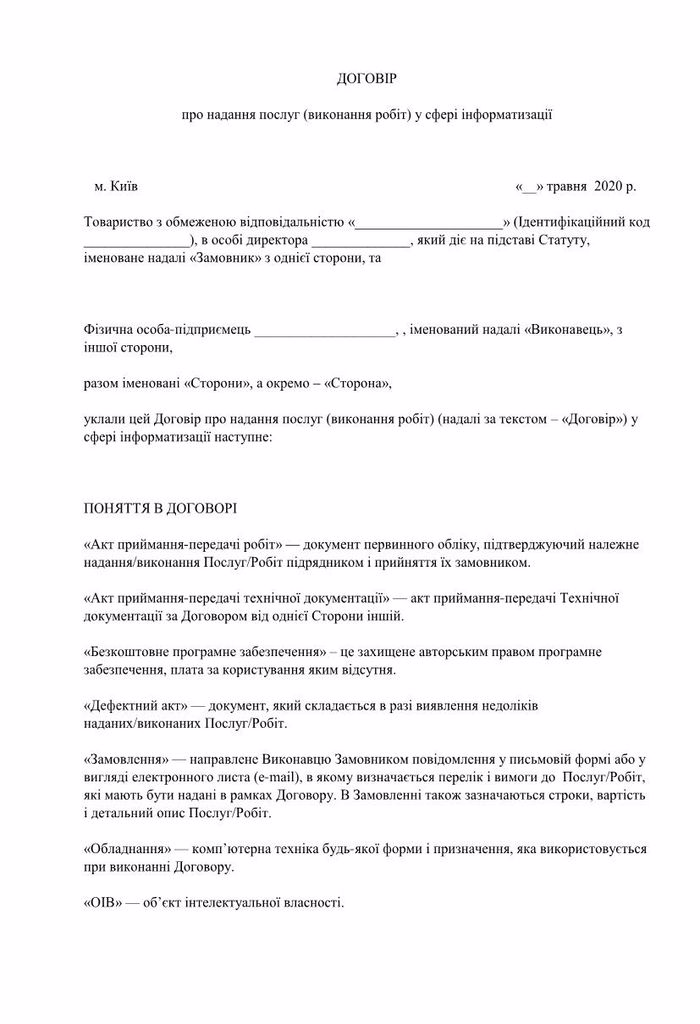FOP vs Gig contracts in IT. What to choose?
Cost of services:
Reviews of our Clients
... our work on joint projects assured us of your high level of professionalism
At the beginning of 2022, the Diia City Law came into effect. We wrote in detail about this law and the advantages and disadvantages of Diia City in our previous publications. This law introduces new terms that will be used by IT entrepreneurs, such as gig-contracts.
We suggest finding out the main difference between gig-contracts and traditional cooperation with individual entrepreneurs for the IT business in Ukraine.
The “hybrid” nature of the gig-contract
A gig-contract is a civil law contract, the relations under which are not covered by the provisions of the Labor Code of Ukraine (hereinafter – the Labor Code). However, if we carefully analyze the Law and compare the provisions of the Law and the Labor Code, we’ll see a lot in common. It is precisely because of such commonalities that lawyers often call gig-contracts a “hybrid” form, which combines elements of civil-law and labor legal relations.
For example, the Labor Code and the Law of Ukraine “On Vacations” provide for a mandatory annual leave of 24 calendar days for employees after the first 6 months of employment (of course, the period and grounds for the leave may be longer). The Diia City law allows for a break of at least 17 business days after 6 months of employment.
Or, for example, the Labor Code as well as the Law define an 8-hour work day and 40 hours of work per week, and the need to determine the working time and rest time for the employee, overtime payments.
Similar to the Labor Code, gig-contracts provide for the possibility of maternity leave, and also allow taking a break from work for 70 calendar days before and 56 calendar days after the childbirth.
It contains a lot of such “hybrid” features, but nevertheless the Law allows to avoid application of rather archaic provisions of the Labor Code regarding dismissal, various social benefits and compensation, peculiarities of work of people with disabilities, parents raising children on their own, etc.
Therefore, the gig-contract, in essence, combines both elements of the employment agreement and the contract with the individual entrepreneur. However, is it profitable for the IT company?
You may also like: Can Ukrainian Sole Proprietors Open a Bank Account Abroad?
The tax aspect of working with IT specialists through gig-contracts
Taxes under the Gig-contract are almost similar to the individual entrepreneur’s taxes of group 3. Both individual entrepreneurs and parties to the gig-contract shall pay unified social tax in the amount of at least 22% of the minimum wage (currently UAH 1,430), and 5% of income (unified tax, tax on wages of under a gig-contract). An additional 1.5% of the military tax is paid from the income of the gig-specialist.
Since, according to Ukrainian legislation, an individual entrepreneur is considered an independent business entity, the administration and payment of taxes shall be carried out by the individual entrepreneur.
Of course, most IT companies have accountants working with individual entrepreneurs who can help with the reporting and payment of taxes. However, legally, it is considered that the taxes are paid by the individual entrepreneur.
For gig-contracts, the obligation to pay taxes would fall on the employer, similar to paying taxes under an employment agreement.
Thus, the difference in the tax context between the gig-contract and agreement with the individual entrepreneur is in two aspects:
- Gig-contracts provide for the payment of a military tax;
- The administration of taxes under gig-contracts is done by a resident of Diia City.
Additionally! For the period of martial law individual entrepreneurs of group 3 can choose the single tax rate of 2%, but there is no reduction in the rate for gig-contracts.
One of the most frequently asked questions is whether it is possible to work both as a gig-specialist and as an individual entrepreneur. Our answer is that you can, as long as there are no special non-competition provisions in the gig-contract. Each particular case should be considered, taking into account the requirements of both the employer and the employee. We can develop for you a comfortable scheme of cooperation with IT-specialists, based on your vision of the business process.
You may also like: Why Should You Make an NDA with IT Specialists?
The right to code: Who owns the rights to the developed product?
According to part 2 of Article 24 of the Law, the property rights to the created intellectual property objects belong to a Diia City resident, unless otherwise provided by the contract. The property rights are acquired by the residents of Dia City immediately after the creation of such intellectual property objects.
In this case, the legislator has somewhat simplified the procedure for acquisition of property rights for employers to the objects of intellectual property rights, compared with the employment agreements or agreements with individual entrepreneurs. In the employment relationship the property rights to the created objects of intellectual property belong to the employee and the employer.
For the transfer of property rights under the contract with an individual entrepreneur, in practice we use the mechanism of the act of acceptance of services / works, which indicate the transfer of property rights. It will not be necessary to do this with the gig-contract.
You may also like: Tax Optimization of IT Projects
Benefits of gig contracts for employers or bondage for IT specialists?
It’s no secret that Dia City was created with IT business in mind, not professionals in the IT sector. That’s why most of the benefits of Dia City apply to IT businesses.
IT business is used to working with individual entrepreneurs, but a gig-contract gives employers the following advantages:
- Reducing the risk of inspections by the State Labor Service aimed at identifying non-employed persons or concealing labor relations. This makes life easier for IT companies, as there should now be fewer inspections.
- The ability to have more control over employees, to establish additional leverage and control over the quality of work.
- Non-competition. You may define a special procedure for an employee to register as an individual entrepreneur, LLC or to conduct other competitive activity, or to work for competitors after dismissal. Such provisions somewhat reduce the mobility of IT professionals and frequent job changes, as a result – lower search costs and more closed projects without broken deadlines.
- Confidentiality and non-disclosure of information received by the employee. This is very important, especially if you work with foreign companies that use the GDPR or other regulations in their work.
- Acquiring the right to the created intellectual property without additional formalities.
It is important to remember that with the loss of Diia City residency status, employment agreements and contracts with individual entrepreneurs do not cease, but gig-contracts will become void after 3 months after the loss of the residency status.
However, along with the benefits, IT companies need to consider the following requirements, which do not apply to contracts with individual entrepreneurs:
- A paid annual break of 17 business days from the 6th month of employment. The contract with an individual entrepreneur usually does not include such provisions, and the issue of the break is regulated by agreement.
- There should be a provision for compensation to the employee in case of unilateral termination of the gig-contract at the company’s initiative.
- Gig-specialists may be charged with fines only for damage to company’s property not exceeding 20% of monthly remuneration. In other cases, the amount of remuneration may not be reduced by fines.
- The need to provide gig-specialists with a break in work due to pregnancy, childbirth and temporary incapacity to work. During this period, early termination of the employment agreement at the initiative of the company is prohibited.
- The non-competition agreement is compensatory.
In general, the gig-contract is an easy way for an IT company to set up its cooperation with IT specialists. The main thing is to take your vision and turn it into the essential terms of the contract in accordance with the legislation.
We can help you make an informed decision whether working under gig-contracts is the right option for you, and we will develop them for you.
You may also like: How Will Diia City Work?
How to conclude a gig-contract with an IT specialist?
A gig-contract shall be concluded in writing, stating that it is a gig-contract and not any other type of the contract.
A gig-contract, as well as any other contract, shall contain information about:
- the subject matter of the contract;
- the price and payment procedure;
- the term of the contract;
- rights and obligations of the parties;
- remuneration to the gig-specialist;
- terms and conditions of termination of the gig-contract.
In addition, the following provisions should be detailed in the gig-contract:
- making changes to the gig-contract. It must stipulate the procedure and period;
- the procedure for termination of the gig-contract, including unilateral termination;
- compensation and liability for damage to the employer’s property;
- the procedure for the execution and control of works;
- working hours and rest time of the gig-specialist;
- performance of work outside the resident’s locality and the order of compensation for relocation;
- bonuses and incentives for gig-specialists in case of improved work results.
In addition to the gig-contract, we recommend entering into a non-disclosure agreement (NDA) and a non-competition agreement (NCA).
There are no template gig-contracts or typical gig-contracts. Therefore, each gig-contract needs to be tailored to the specifics of each gig-worker or the work pattern of a Diia City resident company.
We offer you IT project support services, including registration as a Diia City resident and development of gig-contracts for further work of your project.
Our clients








